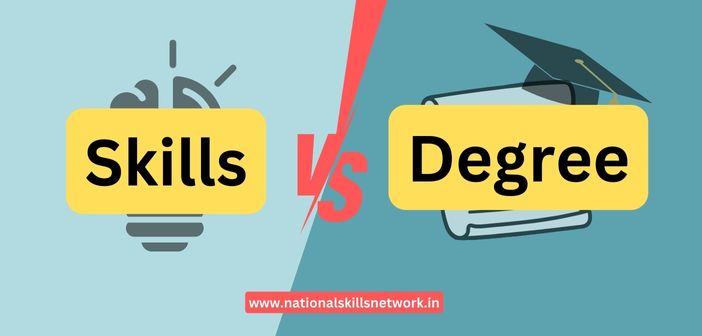Landing your dream job used to be a straightforward equation: degree + experience = success. But the tides are turning. In today’s dynamic job market, employers are increasingly prioritizing skills over traditional qualifications. This isn’t to say degrees are obsolete. They provide valuable knowledge and a strong theoretical base. But why a degree alone is not enough?
Skills vs. Degree: Why Degrees Aren’t Enough
While a degree can provide a strong foundation of knowledge, it often falls short of equipping graduates with the specific skills employers need. The rapid pace of technological advancement means that the skills learned in college might become outdated by the time you graduate.
Here’s a reality check:
- Skills gaps: Many graduates lack the practical skills employers require, leading to a skills gap that businesses struggle to fill.
- Evolving landscape: The job market is constantly changing, with new technologies and roles emerging all the time. A degree in a specific field might not translate well to these new opportunities.
Why Mastering the Right Skills is the Key to Career Success
Here’s why a focus on skills is paramount:
- Rapid technological advancements: Due to continuous change and rapid technological advancements, the shelf life of specific skills is shrinking. Skills like problem-solving, critical thinking, and adaptability ensure you can keep pace with change.
- Demand for specialized expertise: Companies need individuals who can hit the ground running with specific skills. A degree in history might not directly translate to data analysis, but strong analytical skills can bridge the gap.
- Focus on results: Businesses prioritize results over theoretical understanding. Employees who can demonstrate their ability to deliver through their skills are more valuable.

How do you build a robust skillset?
The good news? Skills can be learned and honed! So, how do you build a robust skillset? Here are some actionable steps:
- Identify in-demand skills: Research job postings in your target field. Look for the recurring skills mentioned and tailor your learning accordingly.
- Embrace online learning: Numerous online platforms offer courses, tutorials, and certifications to develop technical and soft skills. For more information on these, please read these resources on our website.
- Seek practical experience: Apprenticeships, internships, freelance projects, and volunteering opportunities provide real-world application of your skills.
- Never stop learning: Stay updated on industry trends and continuously seek new learning opportunities to stay ahead of the curve.
Skills vs. Degree: Showcasing Your Skills
A strong resume and cover letter are crucial, but don’t stop there. Here are ways to highlight your skills:
- Craft a compelling online presence: Use platforms like LinkedIn to showcase your skills and experience. Highlight relevant projects and achievements.
- Build a portfolio: For creative fields, a portfolio showcasing your work is a powerful tool.
- Ace the interview: Prepare to showcase your skills through targeted examples and a demonstration of your ability to learn and adapt.
Also read: What after 10th? Explore Technical Education for a rewarding career
Bonus Tip: Network! Connect with professionals in your desired field. Attending industry events and building relationships can open doors to new opportunities and provide valuable insights into the skills employers seek.
Did you find the information useful? Do let us know by sharing your thoughts!












